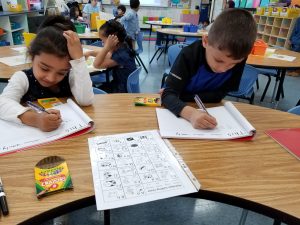At this point during the kindergarten school year, students have been assessed for a second time. We were very impressed with the progress our students made! We expected that our LLI students should be reading at about a level 2 at this point in the school year, they should know all of the upper case and lower case letters along with most, if not all of the sounds. Students should be reading from their book bags each night, this includes the word cards that you find in the bag as well. Of course, don’t forget to read TO your child each day as well!
Spend time together with your child, and talk together! :)
Family stories enrich the relationship between parent and child.
What you’ll need:
Time set aside for talking with your child.
What to do:
Tell your child stories about your parents and grandparents. You might even put these stories in a book and add old family photographs.
Have your child tell you stories about what happened on special days, such as holidays, birthdays, and family vacations.
Reminisce about when you were little. Describe things that happened at school involving teachers and subjects you were studying. Talk about your brothers, sisters, or friends.
Write a trip journal with your child to create a new family story. Recording the day’s events and pasting the photographs into the journal ties the family story to a written record. You can include everyday trips like going to the market or the park.
It helps for children to know that stories come from real people and are about real events. When children listen to stories, they hear the voice of the storyteller. This helps them hear the words when they learn to read aloud or read silently.
Visit Centennial Library over Winter/Christmas break!
Dearborn Public Library’s
Children and Teen Programming
Click the link below to find out what FREE programs you can attend!
Reading with your child
Talking about what you read is another way to help children develop language and thinking skills. You won’t need to plan the talk, discuss every story, or expect an answer.
What you’ll need:
Storybooks
What to do:
Read slowly and pause occasionally to think aloud about a story. You can say: “I wonder what’s going to happen next!” Or ask a question: “Do you know what a palace is?” Or point out: “Look where the little mouse is now.”
Answer your children’s questions, and if you think they don’t understand something, stop and ask them. Don’t worry if you break into the flow of a story to make something clear. But keep the story flowing as smooth as possible.
Talking about stories they read helps children develop their vocabularies, link stories to everyday life, and use what they know about the world to make sense out of stories.
Take- Home book reminders…
PLEASE help your child take care of the books in their book bag. If a book is damaged or destroyed, then we will not have enough books in our groups. These books are expensive and are meant to be used many times. Please do not the books get ripped, folded, wet, or written in.
You will be charged for damaged, missing or destroyed books.
Thank you
How to help your child do a “Retell”
Retelling using the Retelling Bookmark
Click here to watch a short presentation on retelling a story with your child.
If you were unable to make it to our parent meeting, or just want a refresher you can re-watch our short video using the link above.
No Kindergarten on Friday November 17th!
Friday we have no kindergarten. Kindergarten teachers, Young 5’s teachers and ECS will be enjoying a day of professional learning together.
Mandatory Parent Kindergarten Parent Meeting Thursday 11/16 at 2:45
Tomorrow we will have a mandatory kindergarten parent meeting at 2:45. Parents will learn more about the “Read by 3rd grade” initiative in Michigan and learn some fun reading activities too!
See you there!
Michigan eLibrary (Free Resources for Literacy)
https://kids.mel.org/
You’ll find:
BookFlix (Online stories)
Kid Infobits (Kid-friendly research)
World Book Early World of Learning ( Learn about colors, numbers and reading)
